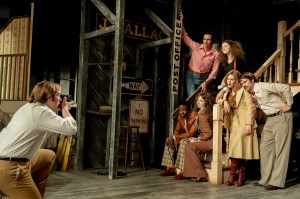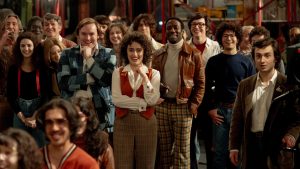DEADLINE: As a Brit, what was your feeling going into the role of Gilda Radner?
ELLA HUNT: Honestly, for me, approaching this movie or when I got sent the audition, part of my initial hesitancy was, I can’t do American humor and thinking I’m never going to get cast as an American comedic icon because it’s just a different lexicon. It’s totally different. But honestly, Gilda has been the greatest guide and teacher into understanding American comedy. I still think I’m approaching it from a strange foreign perspective, but I do think that she’s taught me a lot about how I can play American and be funny because previously, that was really just something that I didn’t imagine that I could do.
DEADLINE: So, you didn’t feel like you were a comedic actor, that you didn’t have the comedic mentality, or it was just the Americanness?
HUNT: Yeah, I guess it’s funny because when I was a kid, how I got started was I did a school production of The Mikado, and I was playing Katisha, who is the comedy baddie of the piece. I was in a fat suit. And I have such a vivid memory of making people laugh and how good it felt. So, I loved that as a kid. And then, I think through my teens and early 20s in film and TV, I was often doing comedies, but I was always the straight guy. And I enjoyed that tremendously, like in Anna and the Apocalypse, the situation is very funny, but she has to be grounded in the reality that all of her loved ones are dying from flesh-eating zombies. And then again with Dickinson, her entire family is dead, and that’s kind of the running joke is that she’s miserable. So I have played all of these miserable women. So I guess just after a certain point, it got into my head that I wasn’t the funny guy or that that just wasn’t going to be the route for me. But thank god this came around, and my agent dared me to try it. But I just was like, “I’m not an American.” I’d had a bunch of friends who are comedians who’d already taped [auditions] for the film for different roles. And when they’d been taping, I have this memory of being like, “Yeah, I completely understand why I’m not going to audition for this. I’m not a comedian. This is so out of my wheelhouse.” And then, I think what I maybe didn’t give myself credit for is that I love doing impressions, and I love doing people’s voices.
(L-R) Ella Hunt as Gilda Radner, Jane Curtain (Kim Matula), Dick Ebersol (Cooper Hoffman), Rosie Shuster (Rachel Sennott), Garrett Morris (Lamorne Morris), Alan Zweibel (Josh Brener) and Lorne Michaels (Gabriel LaBelle) in ‘Saturday Night’
Sony
DEADLINE: Have you been doing that your whole life?
HUNT: Kind of. And it was my party trick as a kid. And then, I think that’s why I live in the States is because I love doing accent work. I’d much rather be in somebody else’s voice than my own.
DEADLINE: What was your party trick impression as a kid?
HUNT: Legally Blonde, American woman in the nail salon. But then there were others, and I got so excited. As soon as somebody gave me the trick into learning dialects, it’s just become a hobby to pick up different people’s voices. But pre-Gilda, I’d never got to do an actual person’s voice. I was doing like a dialect from a place, and it’s a very different experience having a specific person’s voice to step into. And I loved it. And I think on top of that, Gilda and I think are actually very similar in our goofiness. Maybe this is the Brit in me going, I don’t want to toot my own horn, but I think I’m quite an empathetic person. And I think that Gilda, even though Gilda was such a genius, I think first and foremost for Gilda always was empathy and looking out for the person in the room in need, and using every element of her being to make them feel at ease, whether it was childlike or flirtatiousness or naivety, just using everything she could to put people at ease. And that felt just very quickly like something I could understand.
DEADLINE: I’m assuming that you watched every bit of video you could find, and you were practicing the physicality of her and the way she moved and so on. Who did you talk to that was close with her?
HUNT: I talked to Alan Zweibel, who was one of Gilda’s closest friends and key collaborators. Alan was incredibly generous with me and really grounded me in Gilda behind the lens, like Gilda as a human and the kind of intersection of Gilda as a person and Gilda’s experience of being a famous person, which was super helpful. But I think something that we all had to be really aware of shooting this and prepping for this was that it’s before they are famous. So there are all sorts of things that come with fame for each of them that we had to work hard to not include too much. And for me, part of the joy of approaching Gilda in this moment is thinking about getting to sow the seeds of characters that she was beginning to think about, because so many of the characters that she played on SNL were characters that she’d grown up around, so like Emily Litella, the little old lady she plays with Weekend Update, is influenced or inspired by Dibby, who was her nanny growing up. So it was fun to play her just beginning to maybe think about those things. So maybe no one will notice that that’s what I’m doing, but that backstory was in my head. And when we first see Gilda in the mirror at the beginning of the film, the sounds she’s making are… It’s like the beginning of the sound or the beginning of her reaction to Chevy as Emily Litella. That happens later on that season.
DEADLINE: That’s interesting. Tell me about meeting Jason Reitman and the process of coming on board the film in the beginning?
HUNT: I did a tape. I wore a little orange knit my mum made for me. She embroidered a cat onto the front. I’m a massive cat person. So, I did a tape, and when I sent the tape to my agent, I really felt very self-conscious about it and said, “If this is bad, we don’t have to send it, really.” And truly, within an hour, I’d had a call from John Papsidera, the casting director on this film, saying, “I’d love her to meet with Jason next week.”
DEADLINE: How did you feel when you got that?
HUNT: Elated and really surprised and then really relieved because I’d had the best time doing the tape. I was self-conscious about what a big tape it was, and that I think my fallback or default position is usually something fairly understated and small, and that was not my Gilda audition at all.I mean, I remember being a child or in my early teens, and the way I learnt to act on screen was I took the train from Devon to London for auditions, and on the train, I’d run lines with my mum.
DEADLINE: Your mum’s an actress too, right?
HUNT: Yes, and honestly, I think she should have been a director. She’s a really phenomenal director and a lot of my early career lessons were around… I was approaching it from such a big place and stripping all of that away and just sitting and having a conversation with a person. And then, I think as I started playing Americans and doing self-tapes, I just realized that there was so much more that I could convey with my eyes than if I was doing a whole bunch of theatrics. So, it just ended up being my default is to be very understated and focused on what I’m communicating. I think that that’s the case with most screen actors certainly. But just before I shot [Kevin Costner’s] Horizon and then shortly after got Gilda, I’d done Closer on stage in London and had the best time discovering my body through it and discovering how much I could convey with my body. And so, this Gilda audition came in a moment where I was feeling like testing the boundaries of what I could do in a tape. And so, I moved a lot in the tape. I used to sit very still, but I moved a lot, and it was kind of chaotic. The tape started, and I was slapping my cheeks.

(L-R) Dick Ebersol (Cooper Hoffman), Garrett Morris (Lamorne Morris), Chevy Chase (Cory Michael Smith), Laraine Newman (Emily Fairn), Gilda Radner (Ella Hunt), Jane Curtain (Kim Matula) and Dan Aykroyd (Dylan O’Brien) in ‘Saturday Night’
DEADLINE: How was meeting Jason and the producers?
HUNT: Jason was such a hero of mine. Even to get to meet him was a very special thing. Juno was a film that I loved, and I was very aware of how talented he was at casting and discovering young talent. So it felt very special to me that he even wanted to meet. And the day of the casting, I walked from my place uptown to Flatiron where the audition was, listening to the Juno soundtrack because I just wanted some of the buoyancy and play of Jason’s material percolating in my head, even though this was going to be a completely different thing. Music is just often my way into things.
DEADLINE: You’re a musician too.
HUNT: Yeah. Then, in the waiting room, there were truly 10 other Gildas sat waiting to go in with big curly hair. They had the hair. One of my best friends was also there and we hadn’t talked to each other about it. And so, when I sat down with Jason, I was like, “My best friend is out there, and I have this horrible habit of when I get sent a character or when I get sent an audition, I immediately cast my friends in my head, and she’s who I cast in my head. I think that you should cast her.”
DEADLINE: Did he laugh at you?
HUNT: He did laugh at me. He was like, “You have to stop doing that.” But I honestly think it’s part of why I got it is that Jason was really wanting to lean into the essence of what he felt was the center of the spirit [of early SNL].
DEADLINE: Did he tell you that was why?
HUNT: Yeah. Later in an email to me, when I got the role, he mentioned my empathy, and it was one of those meetings that just went fabulously. I remember coming out and feeling like, “Beat that,” which I don’t often feel, but I felt immediately able to be daring and messy and also very intellectually switched on with Jason because he’s so confident and very specific. And so, I did the first take of the scene, and then he literally threw about a hundred notes at me, so many notes that then I had to repeat the notes back to him to make sure that I’d got them all down. And then, I hopped around the room like a little puppy at one point, just ridiculous things that I’d never done in an audition before that I loved that he responded to. And when I got the role, I was flying home for Christmas. I got the call in a Hudson’s bookstore and wept.
DEADLINE: At the airport?
HUNT: Yes. Flying home for Christmas.It was very sweet like something out of a movie.I mean, my family were so delighted, but they also didn’t know who the fu*k Gilda was.
DEADLINE: Exactly. She is so much a U.S. household name and not a British one.
HUNT: I got home and was like, “I’ve got this big job, and I’m playing Gilda Radner.” And they were all a bit like, “Who? Why?” And then, I showed them some videos, and my brothers were like, “Oh, Ella, this is great. Finally, you get to be goofy.” I think they see a very different side of me. I’m a lot sillier than I think. I think because I was a child growing up in the industry, again, another default position for me is to try and seem older and more serious than I am, and that’s taken some unlearning. Living in New York’s been great for that.
DEADLINE: Why did you move to New York and not L.A.? Just curious.
HUNT: Dickinson. I really hadn’t found my people in London nor had I really found my career in London. All of the jobs that I was doing were up north, and I was doing northern accents. And when I came to New York, I was working on a fabulous job, and I felt like the city just unfolded itself for me. I met fabulous people right away, and it was kind of my university.
DEADLINE: Tell me about the hair and make-up and how that helped you? Because obviously the hair is what you mentioned before.
HUNT: Yeah, the hair was a huge deal. I’d become very obsessional about Gilda’s hair to the point where in the later stages of my preparation, I got pretty panicky that I just couldn’t be her without the hair. But what if I put the hair on, and it wasn’t right? And then, the day that Janine Thompson, the head of our hair department, put the wig on me for the first time, it was such a thrill that I literally grabbed her hands and looked up at her and giggled and then maybe cried. It was just such a relief to put that hair on. And the combination of the hair, make-up, and costume for this, it’s really the first experience I’ve had of being completely transported into or personally transported into feeling like a completely different person. And the collaboration with Danny Glicker, the costume designer on this, was something really special. He has a sort of encyclopedic knowledge of Gilda and the Not Ready for Prime Time Players, so much so that we’d be doing fittings, and I’d be putting on a pair of jeans and I’d be like, “Sorry, can we stop? I need to take notes.” Really, he just knew it all, and I had kind of intentionally left holes in my knowledge of Gilda because I didn’t know too much about the later years of her life or get too attached to who she became.
DEADLINE: You were staying in the pre-fame Gilda.
HUNT: Yeah, so I purposefully didn’t overly indulge in her relationship with Gene Wilder or how she dealt with her cancer. And I think that is such a fascinating period of her life. I hope that somebody makes a film about that period someday, but that’s not the Gilda that I was playing. But with Danny, those early fittings were really informative to me about what her costume needed to be for me to move like her. At first, we put on these very tight waisted bell-bottoms, and they looked fab, but I couldn’t move the way she would. And one of the linchpins for me of playing Gilda is that she’s using every fiber of her body for humor and for making people feel at ease. And so, in that first fitting, we worked out that there always needed to be enough room for her to be flopping about in her body however she wants to be. And also, usually in a fitting, you take a bunch of photos and the photos are there as documents of what you’re going to wear each day. But taking the photos was such a crazy exercise, because as a person that’s spent from the age of 11 being an actor, I feel conditioned to want to look pretty in photos.
DEADLINE: Like most women.
HUNT: Like most women, yeah. It’s very difficult to drop it and to enter a room not thinking about being beautiful, but thinking about funny was such a shift for me. And taking photos with Danny and trying to inhabit how Gilda would inhabit a photograph was really instrumental in my prep.
DEADLINE: What kind of feedback did you get, maybe from people that knew her or just in general, people who loved her as a person?
HUNT: I had really prepared myself for people being pretty critical. She’s so beloved, and no one’s going to Gilda the way Gilda Gildas. And I feel like I really just scratched the surface with her, but people have been so nice, so lovely. And I think so much of that is in Jason and Gil [Kenan]’s writing and in the edit and their perspective of her, the way that they lit me and just the detail of the crafts on set. It really is a collaborative thing. I’m just glad that people felt her joy in the film because it was a joy for me to do. And I think that’s why we love Gilda so much is that she’s a force and a spirit in the world that we need. So to get to do that and for that to translate for people is a real honor.






